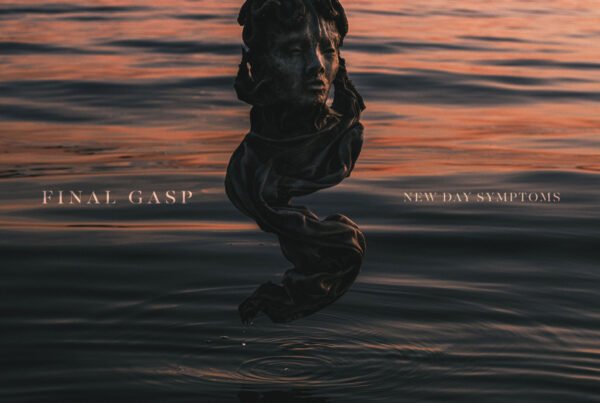Lux Terminus bring forth a wonderfully fresh and thoughtfully composed set of piano focused progressive instrumental tracks in The Courage To Be.
Release date: August 24, 2018 | Independent | Facebook | Twitter | Spotify | Bandcamp
The ebony and ivory coated strips of sugar pine and spruce are no stranger to the world of progressive music. Piano has been an integral – or should I say, instrumental – part of many prolific prog acts over the years, providing an effective emotional catharsis and poignant contrast to what is more commonly used to carry the mids of a mix. What’s less common, especially in our current landscape of predominantly guitar oriented instrumental records, is placing the melodic focus squarely on those delicate rectangles. This is exactly what Vikram Shankar (Redemption) and his former fellow Cleveland bandmates a la Gravity, Matthew Kerschner and Brian Craft, have done in The Courage To Be, the debut record under the Lux Terminus moniker.
From aggressively staccatoed thumping to gentle flickers, all shades of piano and synth act as the key lead in the various arrangements throughout the instrumental record. The bass and drums beautifully accentuate and embellish the energetic and thoughtfully composed moments that highlight each track. Vikram noted that the impetus for The Courage To Be was led by the need to curtail certain musical impulses to ‘fit in’, which fed the idea of freedom in expression on his solo venture. This is readily apparent in the way he dominates the soundscapes with his highly variable emotive performances, and this freedom is a huge boon to the record overall. The ability to write without barriers has led to some wonderful touches, such as the significant shifts in tempo that keep the lengthy record engaging and the unexpected vocals that close off the album.
Speaking of vocals, there are a handful of guest musicians throughout the 64 minute runtime that help to flesh out the instrument landscape. Guitarist Timo Somers (whom you’ve likely heard, even if you don’t recognize the name) and Cellist Raphael Weinroth-Browne have integral parts of the title track, being picked “to fit the music, rather than writing music to fit pre-determined guests”, and Anneke van Giersbergen taking up the aforementioned vocal duties. In touching the inclusion of guests, Vikram explained “I knew from the beginning that we were a three-piece band with no guitars or vocals, and I wrote music that fit that mold, but I also knew that if I wrote a song that needed something not in our toolbox as musicians, it was worth reaching out to others to help give the songs the proper treatment.”
This approach helps flesh out the songs in a more organic way, where what should have been a somewhat jarring, or dominating inclusion, ends up feeling like an extension of the emotional palette. My only trepidation with their inclusion is that I wish there was more of it; while the pure trio pieces are nothing short of great, they only occasionally reach the heights these particular tracks do. As such, it was a smart decision to leave them towards the end of the album.
Touching on a few of the more notable tracks: “Electrocommunion” was perhaps the best choice for a lead single they could have gone with. It’s high energy, full of technical prowess, and one of the more fun and assertive songs on the record. While other tracks dip in and out of this energetic rush, none quite linger on it for as long before divulging into other musical territories. Some of these territories include the bouncy An Endless Sporadic-esque “Miles Away”, the soft jazz of “The Road Home”, and pure dexterous displays in the upbeat “Effusion”. Each track has a unique signature to it that helps set them apart from the rest, though there is the occasional moment in which you might lose your place in the tracklist if you are digesting it in one sitting. Whether you see this as a commendation to the overall consistency and tone of the album, or a detriment to the individual songs themselves, will be determined on the type of instrumental prog you’re more used to listening to.
As touched on before, the final two tracks are easily the highlight of the record. The titular track, “The Courage To Be”, in particular is one of the most beautiful and engaging instrumentals I’ve heard in quite a while, which says a lot for its 20-plus minute runtime. The way the ominous opening note gives away to a gorgeous lone piano melody lets you know you are in for something special. Once more, it continues to surprise and impress as both Raphael and Timo make their appearances, each feeling natural in the context of the song, yet undeniably predominant in the composition. Timo’s contributions in particular are pivotal in capitalizing on the emotional groundwork that the early parts of the song build, something that Vikram was clearly aware of when he gave it precedence over the keys. “I knew that for the emotional climax of the title track, a searing guitar solo was going to be more successful at tugging at the heart strings than a searing synth solo.” This was yet again, another great decision.
The final piece of the multi part suite, aptly titled “Epilogue: Fly”, neatly caps off the lengthy experience with the same emotive touch that the earlier tracks had. Melancholic and notably subdued, Anneke’s vocals take centre stage here, feeling fragile as she runs up and down the musical scale towards the later part of the song. The song also acts as a way of highlighting the concept of the album as a whole: coming to terms with being separated from those you love. “Fly” itself “is from the direct perspective of watching the one you love leave, and trying to find the resolve to continue in the face of recurring separation”, and this perspective colors not only this track, but the four part suite throughout the album as well. To build on this capstone, Vikram had written “Fly” specifically for Anneke to perform over, and the song benefits greatly from this focus.
When taking a step back to view The Courage To Be as a whole, it becomes clear that this really is a special album, one that will likely be criminally underlooked at due to its absence of lead guitar work and the current landscape of the genre. However, this decision to focus on the keys is what makes the record so strong, and to pull the focus from Vikram’s playing would have turned this fresh and inventive collection of songs into another stagnant addition to an oversaturated market. Lux Terminus had the courage to be different here, and it thoroughly paid off. It also provides a great counterpoint to Night Verses‘ aggressive stylings in the recently released From The Gallery Of Sleep. As it stands, we have a beautiful, dense, and thoughtful package that you definitely should give an honest chance.






